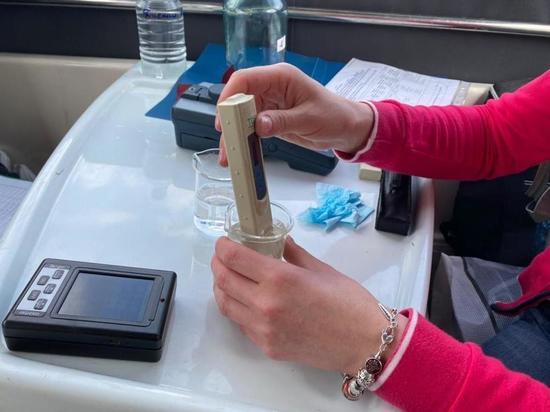
Rostovvodokanal, together with representatives of public organizations and the media, organized several expeditions along the Don River to determine the source of water pollution.
On April 22, experts from the Rostov Vodokanal, representatives of public organizations and journalists set out on another expedition along the Don bed. The task of the expedition was to study the upper reaches of the river in order to understand what factors affect the quality of the Don water.
The water intake points of Rostovvodokanal are certain sections of the Don River, where samples are regularly taken, but no one monitors the state. The water quality in the river is not under the responsibility of Rostov Vodokanal, but experts from the resource supplying company took the initiative to inspect the main waterway upstream. Together with public figures and the media, laboratory specialists made an expedition on a boat to take samples at several points of the river and its tributaries.
“Even with the naked eye, you can see that the water quality at different points of the river is very different,” said Alexander Pchelintsev, a representative of the Association of Environmental Enterprises of the South of Russia, during an expedition across the Don.
Water for research was sampled above the confluence point of Aksayka and Don and in several places of Aksayka itself. After that, for assessment, the samples were sent not only to the central laboratory of Rostovvodokanal, but also to several independent research organizations.
As noted by the general director of the Rostov Vodokanal Alexey Teige, such an expedition is being held for the second time. Prior to that, laboratory experts took water for a sample in the area of Kamensk-Shakhtisky and Konstantinovsk.
“Such an analysis of the results can help to establish the causes of poor-quality water in the river,” said Aleksey Teige. – You need to understand, no matter how high-quality the treatment is, the root of the problem lies in the water source. In recent years, Don’s condition has worsened greatly. For its recovery, a comprehensive program for the recovery of the river and a careful attitude to the nature of the inhabitants themselves are needed.
Note that a sharp deterioration in tap water in Rostov-on-Don occurred in February 2021. The townspeople began to receive massive complaints about the green-brown color of the water and the unpleasant “fishy” smell. The research results showed that the substance geosmin was the cause of the unpleasant odor. It is isolated by some types of blue-green microalgae. In 2021, the allocation process began several days ahead of schedule. This water situation has occurred for the first time in more than 20 years of observation history. To purify water from unpleasant odors, Rostovvodokanal has launched a modern treatment plant based on activated charcoal.
Today, the situation with tap water has improved and complaints about its quality have become much less, although Rostov residents still continue to test tap water in their taps for color and odor.
Alexey Teige also noted that in recent years the level of water pollution in the Don has become higher, and the problem of river shallowing is one of the global problems for the entire Rostov region.
The head of the expedition, director of the technological department, Igor Tron, said that comprehensive research is needed to understand the changes in water quality in the Don. They will help draw conclusions about the necessary work that needs to be done, not only to improve the quality of water in the river, but also, possibly, for further modernization of water purification technologies.
The initiative of “Rostovvodokanal” is relevant now, because the Don rehabilitation project is being actively worked out at the federal level: a “road map” is being prepared for the restoration of the river and water bodies of the Don basin. Also, Rostovvodokanal is ready to actively introduce innovative technologies in the implementation of this project.
In addition, the management of the organization creates a popular control group with a professional environmental council. She will become an active participant in this large-scale project.